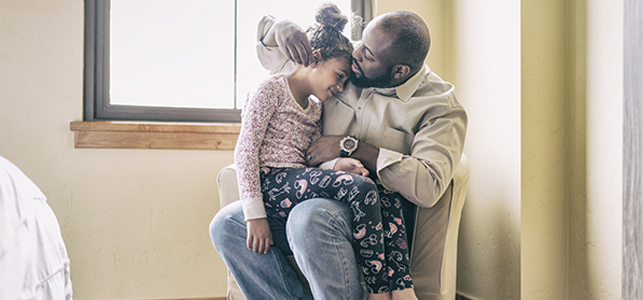
Child regression during the pandemic: Is this the same kid you know and love?
When our world gets upended – like it has with coronavirus (COVID-19) – it can be hard to know how to react. For kids, uncertainty and frustration sometimes come out in the form of regression.
Everyday life is not what it was a few months ago, to say the least.
Have temper tantrums, thumb sucking, clinginess or pre-potty training behaviors shown back up at your home? Maybe your big kid is refusing to make their own snack, or other tasks they’d previously done independently. You thought your children had outgrown these behaviors, right? Rest assured, you’re not alone.
Regression is normal, even expected, during difficult times
 “Although it’s challenging for us as parents, regression is a very normal childhood response to stress or distress,” says Dr. Bergen Nelson, pediatrician and mom of two. “Kids don’t always know how to express the big and uncertain emotions they’re feeling through words. Regression is an unconscious way of telling us they need a little extra love and security right now.”
“Although it’s challenging for us as parents, regression is a very normal childhood response to stress or distress,” says Dr. Bergen Nelson, pediatrician and mom of two. “Kids don’t always know how to express the big and uncertain emotions they’re feeling through words. Regression is an unconscious way of telling us they need a little extra love and security right now.”
It’s challenging enough for us as adults to process what’s going on in our lives currently – changes in work and child care schedules, health concerns and financial worries abound. Parents are getting little reprieve amidst increased demands and it makes sense that these unexpected and added needs from kids might be just the frustration that sets you over the edge.
Helping your child through regressive behaviors
First, be aware of your own stress and anxiety levels and give yourself a break. Sneak a minute to yourself and look for support when and where you can. Maybe this is a video call with an old friend, or a cup of coffee in silence before the rest of the family wakes up. Remind yourself that things will not be perfect – and that’s OK.
When you take care of yourself, you’re in a better position to show your kids the patience, love and calm reassurance they so desperately need right now. This may take the form of a conversation, or just some simple time together – depending on their age, personality and needs.
“The daily interactions children have with caring adults help provide comfort in times of stress,” adds Dr. Nelson. “These moments can include snuggles on the couch, reading a book, hugs, taking a walk or playing together. They don’t have to be scripted and they don’t have to last a long time. Big or small, these everyday moments have the potential to build resilience in both children and adults, buffer stress and support safe, stable and nurturing relationships, helping children thrive.”
A boost for everyone’s mental health
Whether it’s changed in eating or sleeping habits, moodiness, baby talk, fear of being alone or another regressive behavior you’re dealing with, kindness and understanding will get you farther in addressing and overcoming it than punishment. In fact, scolding or negative feedback may exacerbate your child’s stress and lead to further regression.
With so much out of our hands these days, focusing on what we can control – such as loving and supporting our kids – can provide the mental health boost many parents need.
Are you worried about your child’s regressive behaviors? Talk to their pediatrician. They can offer ideas for addressing them or make recommendations for behavioral health support.
